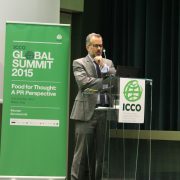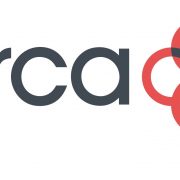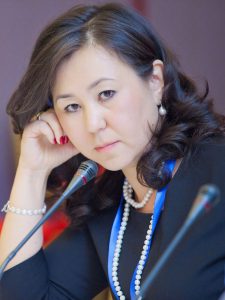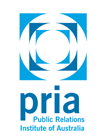Written by: Daney Parker
 @daneyparker
@daneyparker
Editor,
PR Moment
Who are today’s most inspirational PR thinkers? Senior communicators nominate those they most admire and who are helping to shape the PR industry for the better.
Alex Aiken, executive director, UK Government Communications. “Alex is transforming the way in which democracies engage and communicate with the communities it serves for greater accountability, transparency and impact. I learn something new and useful in every interaction with him, and his efforts in public service are just as influential in the private sector,” says David Gallagher, CEO of PR firm Ketchum Europe (who himself happens to be one of PRCA’s Francis Ingham‘s PR heroes, see below).
Adrian Wheeler, five-times divorced ex-chairman of the PRCA, and serial non-exec. Francis Ingham, PRCA director general, nominates Wheeler for his “optimism in the face of reality“. Ingham’s names two more of his PR heroes:
David Gallagher. “Master of making ‘you’re completely wrong’ sound like a compliment’”.
Alison Clarke, ex-CEO Grayling and ex-PRCA chairman: “Spinning the most threadbare of materials into absolute gold: the correctly-named @PitchWitch”.
Liz West, PR manager at theme park Alton Towers. Nikki Alvey, owner of agency Media Hound PR recommends West, “for a very open and well managed PR and social media response to the crisis this year.”
Caroline Kinsey, founder of and chairman of PR agency Cirkle. Neville Hunt, senior lecturer at University of Bedfordshire says: “Caroline has an enviable reputation as one of the top individuals and females in the PR industry and she has had senior roles in the two leading UK PR industry bodies. Caroline is an exceptional person who has won many personal awards and under her leadership Cirkle has won 30 awards over the past three years.”
Simon Sinek, author of Start with Why. “His work on the importance of having a purpose or belief at the heart of every organisation is very inspiring” says Richard Moss, CEO of PR firm Good Relations. Moss lists two other PR thinkers who are an inspiration:
Seth Godin, author of Purple Cow. “My thinking on creativity has been influenced by this book, which is about transforming brands and business by being remarkable, had a real impact on me. The very best creative work is always inherently remarkable – quite literally – it’s worth talking about.”
Malcolm Gladwell, I really admire his work in ‘The Tipping Point’, a book which theorises the factors at play when an idea “crosses a threshold, tips, and spreads like wildfire”.
Sarah Scales, co-founder of PR agency Brands2Life. Sally Bratton, managing director or agency Bratton PR, says: “Sarah is an inspiration: I worked with her, in a freelance capacity, around 10 years ago and was impressed by her commitment to client needs, as well as the speed and effectiveness of her decision-making. In addition, she has built a strong team around her, who she works well with to achieve the best possible results.”
Michael Prescott, global head of comms at BT. “Michael has been integral to moving perceptions for BT from a utility to a modern media company in close partnership with the CEO and board. He came into PR after years as a national political and home affairs journalist. Kept his strong sense of what works for media and political audiences in terms of engaging communications. One of the best connected and most liked PROs in the UK across media, politics and other key influencer audiences.” Nominated by Colin Byrne, CEO, UK & EMEA at PR firm Weber Shandwick, who by happy coincidence is our next nominee.
Colin Byrne, Weber Shandwick. “Strangely enough as a PR professional I actually choose not to follow many of the ‘top PR gurus’ because I often find their views too corporate or outmoded. However, there is one person in the PR world who proves this viewpoint wrong; Colin Byrne. Perhaps the reason for this is that he’s not your typical PR agency head. In fact, ‘left-wing, Northern and working class’ is the Weber Shandwick Europe chief’s description of himself.” Byrne’s admirer is Sharon Barlow, director and PR specialist at agency Stop and Stare Marketing.
Francis Ingham, PRCA. “Francis has expanded the membership, the services and the professionalism of the PRCA and the industry … and he has done whilst enjoying himself.“ Nominated by Trevor Morris, professor at Richmond University. Morris goes on to praise two other of his PR heroes …
Tim Bell, founder of PR firm Bell Pottinger. “Never pious. never dull, often controversial, nearly always charming. Still the biggest and probably the oldest name in the industry.”
Sally Costerton, director at Sally Costerton Advisory. “For her drive, her success and her advocacy for senior women in PR”.
Paul Sutton, independent social and digital media consultant: “Paul has a good view on things, especially the intricate relationship between PR/social/content and I enjoy reading his blog. Paul, like me, has grown up in a traditional PR world but has embraced the opportunities that digital brings the industry.” Sutton is one of the choices of Jim Hawker, owner of PR agency Threepipe, his other choice is Danny Whatmough.
Danny Whatmough, head of social, EMEA at Weber Shandwick. “Danny has got a good grip on things from an integrated way of thinking and I find myself agreeing on most of his viewpoints. Danny is great at filtering news and making good reading recommendations through his Twitter channel.”
Sally Hetherington, business and creative communications consultant. Jane Austin, owner of agency Persuasive Communications says: “Sally just gets on with it and has no ego – it gets in the way of good relationships, good results and a good time. Sally has integrity, doesn’t submit
to trends and has always trodden her own path. She’s instinctive, tenacious, endlessly creative and always hits the spot.”
Anne Gregory, professor at the University of Huddersfield: “Anne has given great public service as CIPR president and, latterly, as chair of the Global Alliance for Public Relations and Communication Management. Anne’s recent book with Paul Willis on Strategic Public Relations Leadership should be read by all PR and corpcomms managers.” Nominated by Tom Watson, professor at Bournemouth University, his other nominee is below.
Ansgar Zerfass, professor at the University of Leipzig in Germany. “Ansgar is current chairman of EUPRERA and is the leading communications management researcher in Europe and probably world-wide. He was one of the founders of the European Communications Monitor which is the annual benchmark study of current corpcomms practice. Ansgar has excellent relationships with many major German industrial and financial organisations which fund practice-oriented PR and corp comms research in a manner not found in the UK. His research papers are well worth reading as they consider current issues”.
Soundbites
When we asked “who are your PR heroes these days?”, two senior PROs explain why they cannot name names:
Graham Goodkind, group CEO & Founder of agency Frank PR: “I get constantly inspired by the young talent coming into Frank, they are the ones who provide the new and fresh thinking that leads us to come up with better and better ideas. As one gets older and has done PR for a while, there is a natural tendency perhaps to do the stuff that has worked in the past. A negativity acquired by experience can also develop; you start to hear “Oh, that’ll never work” one too many times. Whereas those fresh to this business have a lovely naivety, they don’t know if things are possible or not, so they naturally push through barriers to come up with really great insights and creativity.”
Jane Carroll, head of corporate development at Peppermint Soda: “When it comes to PR, it’s not necessarily hearing people talking sense, but seeing it in action that impresses me. The term ‘guru’ can be thrown around with great abandon and, in my opinion, should be approached with a healthy dose of scepticism.
“Of course, there are many stellar PR people in the industry who do excellent work day in, day out. The people I look up to in the sector are often those who do a great job, yet work quietly in the background. For example, the comms team at Alton Towers handled a very intense crisis management situation with extreme calm and proactivity earlier this summer – it’s work like this which should be applauded.”
Original Article from PR Moment
















